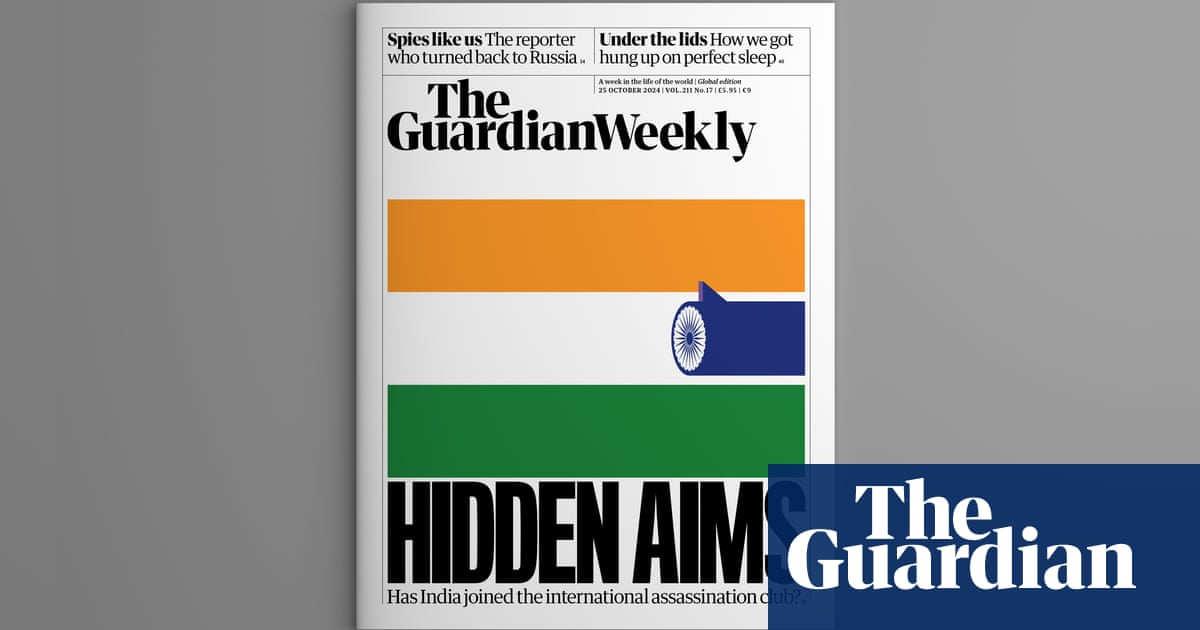India: the new rogue nation? Inside the 25 October Guardian Weekly
Is Modi’s government an international bad actor? Plus: the stuff of sleep
Get the Guardian Weekly delivered to your home address
Canada’s slow rumble of anger over India’s alleged government involvement in attacks in the country last week erupted fully when prime minister Justin Trudeau told New Delhi’s envoys he had “put them on notice” not to endanger Canadian lives. Since 2023, the Guardian Weekly has reported on a series of arson attacks, drive-by shootings and murder plots directed at the Sikh diaspora so for this week’s edition we pull together the threads of a long and complex story and ask whether India has become a rogue state acting to pursue its interests across borders by illegal means.
In Canada, Leyland Cecco reports on what now appears to be a wide-ranging and violent campaign of intimidation against activists linked to the Khalistan movement for a separate Sikh state and other vocal opponents of Narendra Modi’s government. Our south Asia correspondent, Hannah Ellis-Petersen, analyses the basis for Canada’s allegations and explores a murky playbook that appears to link Modi’s officials and diplomats to a criminal network orchestrated by one of India’s most notorious gang leaders.
Of course, with just a fortnight to go before the US presidential election, we also cover events south of the 49th parallel with a report from the Anywhere but Washington series – this time from Louisiana – but the implications of the transnational terror club apparently gaining a new member felt important to focus on for this edition.
Get the Guardian Weekly delivered to your home address
Five essential reads in this week’s edition
1
Spotlight | Small and lethal
Emma Graham-Harrison reports on Russia’s latest tactic to wear down the morale of Ukrainian civilians in the frontline city of Kherson: tiny drones too small to be picked up by Kyiv’s air defences that drop mini grenades to maim residents out on the streets
2
Environment | What on earth’s happened to the carbon sink?
Scientists are increasingly worried that as the planet heats up, land and oceans are losing their ability to absorb CO2, finds Patrick Greenfield
3
Features| Spies like us
When eastern Europe correspondent Shaun Walker first met Pablo González on a training course for reporters who work in conflict zones, he seemed like a regular journalist, fond of a good bar-room story. But then González was arrested on spying charges in Poland and suspicions of his true occupation grew
4
Opinion | A tiny proportion of US voters wield the power
Guardian US columnist Lawrence Douglas asks why the electoral college system still holds sway when it is such a manifestly defective means of electing the president
5
Culture | Who’s the hero now?
A seat in the writer’s room for new TV comedy series The Franchise gave Marina Hydean insight into a world of dysfunction, missed deadlines and anxious film-makers surrounding the creation of a superhero movie
What else we’ve been reading
World leaders gathered this week in Cali, Colombia, for a biannual summit to discuss the state of life on Earth, seeking ways to preserve biodiversity and stop the destruction of nature. Patrick Greenfield has written this helpful primer on Cop16 and what’s at stake. Graham Snowdon, editor
Other highlights from the Guardian website
Audio| Moldova’s razor-thin EU referendum result – podcast
Video| Royal fans revel during King Charles and Queen Camilla’s visit to Sydney Opera House
Gallery| In the workshop with the Royal Academy of Music’s luthiers
Get in touch
We’d love to hear your thoughts on the magazine: for submissions to our letters page, please email weekly.letters@theguardian.com. For anything else, it’s editorial.feedback@theguardian.com
Follow us
X
Get the Guardian Weekly magazine delivered to your home address
- India
- Inside Guardian Weekly
- Canada
